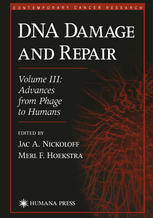

Most ebook files are in PDF format, so you can easily read them using various software such as Foxit Reader or directly on the Google Chrome browser.
Some ebook files are released by publishers in other formats such as .awz, .mobi, .epub, .fb2, etc. You may need to install specific software to read these formats on mobile/PC, such as Calibre.
Please read the tutorial at this link: https://ebookbell.com/faq
We offer FREE conversion to the popular formats you request; however, this may take some time. Therefore, right after payment, please email us, and we will try to provide the service as quickly as possible.
For some exceptional file formats or broken links (if any), please refrain from opening any disputes. Instead, email us first, and we will try to assist within a maximum of 6 hours.
EbookBell Team

4.0
86 reviewsIn recent years it has become increasingly apparent that DNA repair processes play key roles in protecting genome integrity, where the failure of repair systems is directly responsible for many, if not the majority of, cancers. In DNA Damage and Repair, Vol. III: Advances from Phage to Humans, Jac A. Nickoloff and Merl F. Hoekstra update and expand their two earlier acclaimed volumes (Vol. I: DNA Repair in Prokaryotes and Lower Eukaryotes and Vol. II: DNA Repair in Higher Eukaryotes) with cutting-edge reviews by leading authorities of primary experimental findings about DNA repair processes in cancer biology. The reviews cover a wide range of topics from viruses and prokaryotes to higher eukaryotes, and include several new topics, among them the role of recombination in replication of damaged DNA, X-ray crystallographic analysis of DNA repair protein structures, DNA repair proteins and teleomere function, and the roles of BRCA1 and BRCA2 in DNA repair. The contributors make every effort to integrate the basic experimental information with clinical aspects of cancer biology as they relate to DNA repair.
Authoritative and up-to-date, DNA Damage and Repair, Vol. III: Advances from Phage to Humans surveys the rapidly moving research in DNA damage and repair, offering broad integrated coverage that will help researchers understand the important functional relationships among different DNA repair pathways, as well as the relationships among DNA repair pathways, cancer etiology, and cancer therapies.